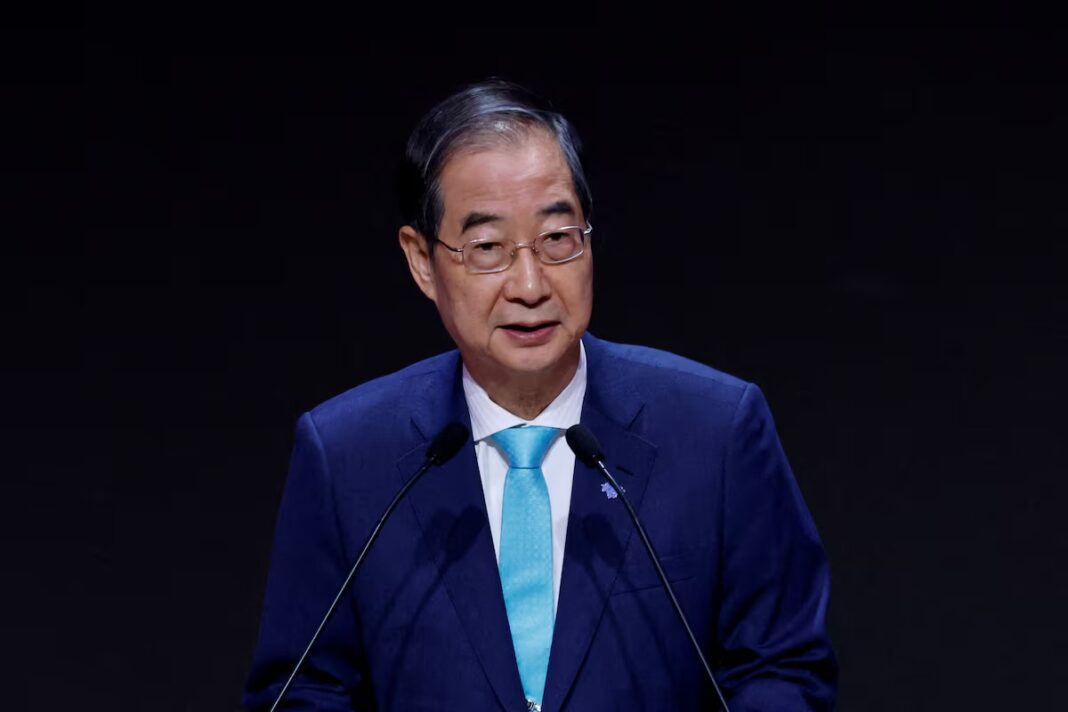South Korea is bracing for further political uncertainty as the main opposition party, the Democratic Party (DP), prepares to submit a bill to impeach acting President Han Duck-soo. The move follows the impeachment of President Yoon Suk Yeol earlier this month and adds to the country’s ongoing political tensions.
Impeachment Push Targets Acting President
The Democratic Party, which holds a majority in South Korea’s parliament, announced plans to submit the impeachment bill against Han Duck-soo. The party accuses Han of delaying the approval of critical legislation, including a special counsel investigation into President Yoon’s controversial attempt to impose martial law on December 3.
South Korean law requires the finance minister to step in as the next acting president if Han is impeached. The opposition plans to introduce the impeachment bill to a plenary session on Thursday, where parliament must vote on it within 24 to 72 hours.
Backdrop of Political Crisis
Acting President Han Duck-soo took charge after authorities suspended President Yoon on December 14. The Constitutional Court is reviewing Yoon’s case to decide if he will return to office or face permanent removal.
His impeachment stemmed from allegations of attempting insurrection and other charges. The Democratic Party also seeks to investigate allegations involving Yoon’s wife, further fueling tensions between the ruling People Power Party (PPP) and the opposition.
Opposition’s Accusations Against Han
The DP accuses Han of stalling key bills aimed at addressing President Yoon’s alleged misconduct. The party’s frustration grew after Han postponed a special counsel law during a cabinet meeting, instead urging collaboration between ruling and opposition parties. The DP’s floor leader criticised Han for what they view as intentional delays, arguing that immediate action is necessary to address the nation’s political challenges.
Debate Over Impeachment Requirements
South Korea’s constitution requires different voting thresholds for impeaching a president and a prime minister. A president needs a two-thirds majority in parliament, while a prime minister can be impeached with just a simple majority.
Given the DP’s majority, they could impeach Han without the support of the PPP if only a simple majority is required. However, a two-thirds majority would require cooperation from at least eight members of the ruling party. The decision on the required threshold rests with Parliament Speaker Woo Won-shik, who plans to consult legal experts and parliamentary guidelines.
Concerns Over National Stability
Critics of the impeachment move warn that further political upheaval could harm South Korea’s stability. International allies, including the United States, have recently restarted communications with the country under Han’s leadership.
Some officials argue that disrupting the acting president system could undermine global trust in South Korea and hurt its economy. These concerns have added weight to the debate surrounding Han’s potential impeachment.
President Yoon’s Silence Amid Legal Battle
Since his impeachment, President Yoon has largely remained out of the public eye. He has yet to announce his legal team or respond to a summons for questioning related to his martial law attempt.
Yoon is prioritizing the upcoming Constitutional Court trial, which will decide his political fate. If the court rules against him, Yoon will be permanently removed from office. If reinstated, he could regain his presidential powers.
Political Implications for South Korea
The impeachment process highlights the deep divisions in South Korea’s political landscape. The rivalry between the DP and PPP has escalated, with both sides accusing each other of undermining democratic processes.
For the Democratic Party, impeaching Han represents a broader effort to hold the government accountable. For the ruling PPP, it signals a challenge to their authority and a threat to national stability during a critical time.
What’s Next for South Korea?
The coming days are pivotal for South Korea’s political future. If Han is impeached, it could deepen the country’s leadership crisis and delay critical government functions. The focus will also remain on the Constitutional Court’s trial. This could either stabilise or further destabilise the nation depending on its verdict.
As South Korea navigates this turbulent period, the world watches closely, mindful of the potential implications for Asia’s fourth-largest economy. The unfolding events underscore the challenges of balancing political accountability with national stability.

